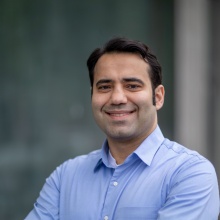Field of Work
Prof. Saliba's research focuses on perovskites, a new class of semiconductors that Saliba has played a key role in developing and which is seen as a source of hope for sustainable energy production. They can be painted as "solar paint" on a wall or even on curved, flexible surfaces where they function as highly efficient solar cells. Since neither clean rooms nor high temperatures are required for this, solar cells based on perovskite have the long-term potential to be produced more cheaply than silicon solar cells and also to open up new areas of application, for example in cars, in space travel or in sensors for the Internet.
In addition, perovskites can be applied to conventional silicon, thus combining the strengths of both material classes: Silicon, for example, uses sunlight in the red and infrared range particularly efficiently, while perovskites are particularly good at converting blue light. "If the materials, i.e. perovskites on silicon, are stacked on top of each other, the efficiencies of already commercial silicon cells can be increased considerably. This tandem idea has the potential to herald a solar revolution," Saliba is confident.
In addition, perovskites make it possible to open up the research horizon to general optoelectronic applications. For example, perovskites can also emit light and be used in new types of light-emitting diodes. In the past, Saliba has also published papers on new types of cryogenic perovskite detectors, which are relevant for the early diagnosis of cancer, among other things.
Personal Information
Michael Saliba, born in 1983, studied mathematics and physics at the University of Stuttgart and received his doctorate in Oxford in 2014 as one of the first scientists ever in the field of metal-halide perovskites. He completed his postdoctoral research as a Marie-Curie Fellow at the École polytechnique fédérale de Lausanne (EPFL) in Switzerland. In 2018, Saliba accepted a group leader position at the University of Fribourg (Switzerland) and in 2019 he moved to the TU Darmstadt as a professor. Since June 1, 2020, Prof. Saliba has been head of the Institute for Photovoltaics (ipv) at the University of Stuttgart. He is also head of a Helmholtz Young Investigators Group at Forschungszentrum Jülich.
With more than 100 published articles, Times Higher Education lists Prof. Michael Saliba as the third most influential scientist in his field. Since 2018 he is ISI Highly Cited, a designation for the top 1 percent of the most cited scientists. This year, the German Research Foundation (DFG) awarded him the renowned Heinz Maier-Leibnitz Prize for his work, and also in 2020 he was accepted into the Young Scientists Group of the World Economic Forum. Saliba has also been awarded the Young Scientists Prize of the German Association of Universities, the Postdoctoral Award of the Material Research Society (MRS) and the TR35 of the MIT Technology Review, which recognizes the world's leading "35 innovators under the age of 35". Michael Saliba is also a member of the Global Young Academy and the Young Academy.


